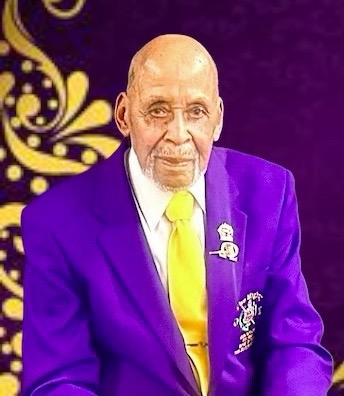Charles F. Booker was an Army veteran, civil servant, and community activist who fought against racially discriminatory schools in Plainfield, New Jersey. A native of Plainfield, Booker was born on May 26, 1923, and was raised by his aunt, Mrs. Martha Neal. In 1949, he married Anna Jane Downing, and they raised two children, Charles B. (Sharif) Booker and Beverly Ann Booker Shelton.
Booker received his education from the Plainfield Public School system, graduating from Plainfield High School in 1941. He earned a BS Degree in Accounting and an MBA Degree in Finance from Seton Hall University in 1955 and 1967, respectively.
Booker enlisted in the U.S. Army during World War II, serving in England, France, and Germany. After a three-year stint from 1943 to 1946, he was honorably discharged with the rank of Master Sergeant. After leaving the Army in 1946, Booker returned to Plainfield and became active in the community, volunteering and serving on ten boards, including the Board of Adjustment, Housing Board, and the School Board.
Booker began working as a federal civil servant in 1947 for the Veterans Administration. In 1969, he transitioned to the Department of Housing and Urban Development, where he held progressive roles as an Equal Opportunity Specialist, Deputy Director of the Housing Management Division, and Chief Officer of Housing Management.
In 1965, Booker, as a member of the Plainfield NAACP branch, initiated and won the landmark lawsuit known as Charles B. Booker v. the Board of Education of the City of Plainfield. Booker and his wife, Anna, the first Black teacher in Metuchen, New Jersey, brought the lawsuit against the Plainfield Board of Education after he and others failed after several attempts to correct the imbalance in education for Black students in the district. Prior to the lawsuit, the City of Plainfield supplied Black students at Washington School, an elementary school that had most of the city’s African American students, with inferior educational opportunities. For example, Washington School was the only one in the city that did not have a special reading program. A study done before this lawsuit was filed proved that students at Washington School received an inferior education.
Booker first approached the Plainfield Board of Education to request that his son, who had expressed interest in the special reading program, be given permission to transfer to another school, Evergreen, which had the program. When the School Board denied his request, Booker, at the urging of the local NAACP branch, filed the lawsuit. That suit, decided on June 28, 1965, changed how the students were placed in schools, how funding was allocated, and how the City of Plainfield chose board members. This case also inspired Black parents in other New Jersey cities to pursue similar lawsuits.
In 2021, the Plainfield Board of Education voted to name the Charles and Anna Booker School for him and his wife. Two years later, in September 2023, the new Charles and Anna Booker Elementary School was opened on the site of Washington School.
Do you find this information helpful? A small donation would help us keep this available to all. Forego a bottle of soda and donate its cost to us for the information you just learned, and feel good about helping to make it available to everyone.
BlackPast.org is a 501(c)(3) non-profit and our EIN is 26-1625373. Your donation is fully tax-deductible.
Justia US Law, “Booker v. Board of Education of City of Plainfield” Booker v. Board of Education of City of Plainfield :: 1965 :: Supreme Court of New Jersey Decisions :: New Jersey Case Law :: New Jersey Law :: US Law :: Justia
WABC-TV New York, “New Jersey school to be named after civil rights icons Charles and Anna Booker who fought segregation” https://abc7ny.com/education/nj-school-to-be-named-after-civil-rights-icons-who-fought-segregation/10353868/
Cheryl Makin, “Plainfield’s new $60 million school ready to welcome students” Charles and Anna Booker Elementary School in Plainfield NJ opens (mycentraljersey.com)
Your support is crucial to our mission.
Donate today to help us advance Black history education and foster a more inclusive understanding of our shared cultural heritage.

